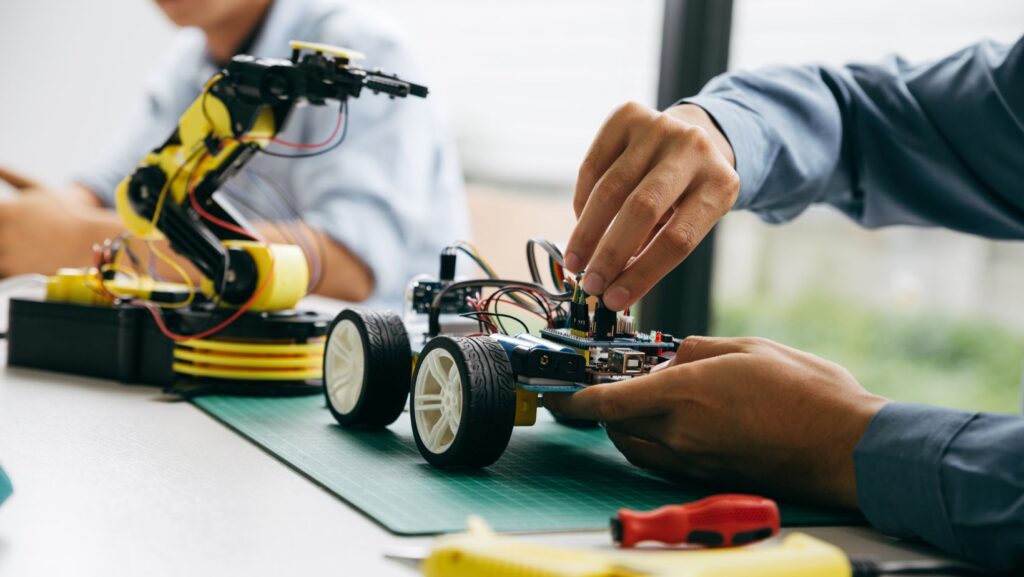Ever tinkered with a gadget and thought, “I could build something like this?” Well, you’re in the right place. This article dives into the captivating world of DIY engineering projects, where creativity meets functionality.
DIY Engineering Projects
Diving deeper into the realm of DIY engineering projects, it’s key to comprehend the benefits these undertakings offer to both seasoned and neophyte engineers. This not only garners a deeper understanding but also reinforces their dedication and interest in this practical application of engineering principles.
Benefits of DIY Engineering Projects
 DIY engineering projects boast a plethora of advantages that justify their popularity amongst enthusiasts. The rewards are multifold, encompassing areas such as skill development, practical application, cost-effectiveness, and engaging mental activity.
DIY engineering projects boast a plethora of advantages that justify their popularity amongst enthusiasts. The rewards are multifold, encompassing areas such as skill development, practical application, cost-effectiveness, and engaging mental activity.
- Skill Development: Embarking on DIY engineering projects enables individuals to bolster their technical skills. For instance, constructing a DIY drone illustrates the intricacies of aeronautical engineering, thereby honing one’s understanding and practical ability.
- Practical Application: Such projects accentuate the concrete application of theoretical knowledge. A mini wind turbine exemplifies how theories regarding wind energy conversion take form in reality.
- Cost-Effectiveness: DIY engineering projects generally tend to be cost-effective. Participants build functional models using affordable or recycled materials, cutting down the overall expenditure.
- Mental Stimulation: These projects bring zest to the minds of creators. They entail problem-solving and creativity, providing an invigorating mental exercise while catalyzing a sense of accomplishment upon project completion.
In sum, DIY engineering projects harvest colossal benefits for individuals of all levels. They bridge the gap between theory and application, empowering creators with enriched knowledge, practical skills, and a sense of gratification.
Top DIY Engineering Projects to Try
In the realm of engaging, skill-enhancing DIY engineering projects, several standout examples stimulate both the curiosity and problem solving abilities of engineers — whether seasoned or novices. These hands-on endeavors effectively combine innovation with practice, further exemplifying the fusion of creativity and functionality.
Building a 3D Printer From Scratch
Construct a 3D Printer is one of such DIY engineering projects that sits at the intersection of creativity and practicality. Crafting a 3D printer from scratch demands the practical application of electronics knowledge and fine mechanical acumen. For instance, assembling the frame serves as a test of mechanical aptitude, while wiring together the printer’s electronic components requires a sound knowledge of electronics.
Moreover, with CAD software knowledge, one may choreograph the movements of the printer, aiding in not only the creation of the machine but also the desirable 3D models. This project enhances a myriad of important skills: from analytical thinking to detail orientation, all while bridging the theoretical knowledge of engineering with hands-on application, epitomizing the ethos of DIY engineering.
Creating Your Own Home Automation System
Designing a DIY Home Automation System effectively embodies the dynamism of engineering projects. By employing modules for controlling the lighting, appliances or security systems of a house, this project offers an opportunity to code piece by piece the entire operation of the household.
lighting, appliances or security systems of a house, this project offers an opportunity to code piece by piece the entire operation of the household.
This activity, while harnessing teamwork and communication skills, also enables the integration of practical coding knowledge and electronics proficiency. Much like the construction of a 3D printer, this project necessitates an intriguing fusion of creative flair and practical ability, truly showcasing the unique appeal and exploratory nature of DIY engineering.
Designing a Solar-Powered Charger
The crafting of a solar-powered charger emerges as a more eco-friendly DIY engineering project. This activity teaches the practical application of harnessing renewable energy and underscores the process of transforming and storing solar energy for later use.
An engineer may be tasked with developing a rechargeable battery system, embodying mechanics understanding. Alternatively, they may employ their electronics knowledge, managing the processes for capturing and converting solar power. Such projects illustrate the true efficacy of self-learning and demonstrate the capabilities of DIY engineering in a controlled, productive environment.



